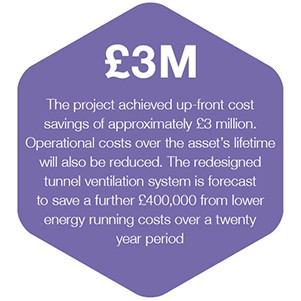National Grid: CAPEX
Delivering value through sustainable design on the London Power Tunnels project
In 2011, National Grid embarked on a seven year project to rewire London’s high-voltage electricity network via deep underground tunnels. This was to provide for increasing electricity demand and to meet regulatory requirements for safety and efficiency. A total of 32km of tunnels are being constructed between 20m and 60m deep below the road network. By housing the cables deep underground, the London Power Tunnels (LPT) project is minimizing disruption to London’s traffic and visual amenity during construction, and will enable National Grid to carry out future maintenance work without digging up the road network.
Carbon, waste and cost saving – Through years of experience in driving out cost from capital projects, we recognized a correlation between carbon savings, waste savings and cost savings. Driving carbon and waste reductions benefits the environment and society, but has delivered tangible financial benefits too. So we know that looking for a sustainable solution could also lower our costs.
Sustainability drives innovative design – We worked with our suppliers to develop standard tunnel design options as well as more innovative designs that minimized carbon emissions and waste. We used a carbon modelling tool to measure the projected carbon emissions for the different design options. A Sustainable Options Appraisal Tool was also used to compare the sustainability characteristics of the different options qualitatively. Having conducted this analysis, we selected a reduced size tunnel design that would require less excavation during construction and lower energy consumption for ventilation during operation.
Delivering value – By embedding sustainability into the design and build of the tunnels, the project has achieved up-front cost savings of approximately £3 million. Operational costs over the asset’s lifetime will also be reduced. The redesigned tunnel ventilation system for example is forecast to save a further £400,000 from lower energy running costs over a twenty year period.
By reducing the tunnel size, using low carbon cement and redesigning the tunnel ventilation system, the project will also achieve a 40% reduction on carbon emissions over the lifetime of the asset. By re-using spoil from underground tunnelling as backfill for remediation sites elsewhere, National Grid has already diverted 48,000m3 of waste from landfill, reducing lorry haulage distances by between 21% and 88%. These features, combined with others such as a green roof and energy recovery that benefits local communities, have also made LPT an environmental award -winning project.





